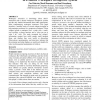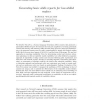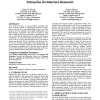84 search results - page 9 / 17 » Designing for people who do not read easily |
103
Voted
SIGDOC
2009
ACM
15 years 8 months ago
2009
ACM
Users of help systems often complain that they do not find them useful; while they still use help at least occasionally, they resort to other problem-solving strategies. In this p...
KR
2000
Springer
15 years 5 months ago
2000
Springer
Large-scale ontologies are becoming an essential component of many applications including standard search (such as Yahoo and Lycos), ecommerce (such as Amazon and eBay), configura...
130
click to vote
CSCW
1996
ACM
15 years 6 months ago
1996
ACM
Workspace awareness is knowledge about others' interaction with a shared workspace. Groupware systems provide only limited information about other participants, often comprom...
107
click to vote
NLE
2008
15 years 1 months ago
2008
We describe SkillSum, a Natural Language Generation (NLG) system that generates a personalised feedback report for someone who has just completed a screening assessment of their b...
100
click to vote
DESRIST
2009
Springer
15 years 5 months ago
2009
Springer
As a result of the rigor vs. relevance debate, researchers who focus on design research on organizational problems are beginning to focus on their research methodology’s rigor. ...



